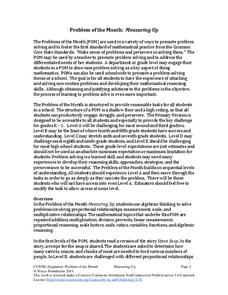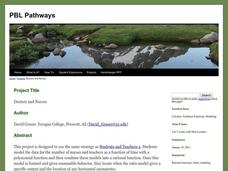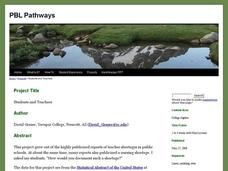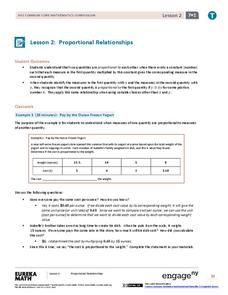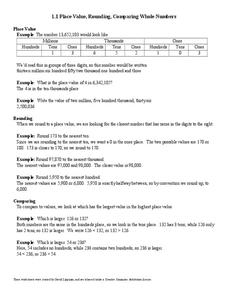Teach Engineering
Scale Model Project
Try your hand at scale models. Scholars create a scale model of an object using a scale factor of their choice. As part of the project, they give presentations on their processes and calculations. This is the last installment of the...
Noyce Foundation
Lyle's Triangles
Try five problems on triangles. Levels A and B focus on shapes that can be created from right triangles. Level C touches upon the relationship between the area of a six-pointed star and the area of each triangle of which it is composed....
Noyce Foundation
Measuring Up
Teach the basics of measurement and conversion with a five-lesson resource that builds an understanding of proportion and measurement conversion from elementary through high school. Initially, young scholars use ratios to determine soup...
PBL Pathways
Doctors and Nurses
How many nurses does it take to support one doctor? A project-based activity asks learners to analyze state data to answer this question. Classes create polynomial functions from the data of doctors and nurses over a seven-year...
PBL Pathways
Students and Teachers
Predict the future of education through a mathematical analysis. Using a project-based learning strategy, classes examine the pattern of student-to-teacher ratios over a period of years. Provided with the relevant data, learners create a...
Worksheet Web
Learning About Rate
After reading a one-page passage on how to understand and solve distance/rate problems, young mathematicians answer six word problems that have them correctly set up the formula in order to solve for the distnace, rate, or time in the...
EngageNY
Finding Equivalent Ratios Given the Total Quantity
Complete incomplete tables by using proportions. Pupils use information provided to complete tables based on proportions. Class members use their knowledge of part-to-part ratios and totals to find the missing information.
EngageNY
Identifying Proportional and Non-Proportional Relationships in Tables
Learners determine whether there is a constant multiple within the table through an instructional activity that presents a method for determining whether two quantities are proportional. Pupils analyze tables to determine if they...
California Mathematics Project
Meteorology
See how estimation is essential to making temperature weather maps. Scholars use ratios and rates of change to estimate temperatures at locations where temperature readings have not been made. They connect this idea to linear functions.
Mathematics Assessment Project
Statistics and Probability
Quickly assess basic understandings of statistics and probability. The resource contains five quick tasks from the probability and statistics domain. The questions range from finding simple conditional probabilities to measures of...
EngageNY
Relating Scale Drawings to Ratios and Rates
Enlargements and reductions are all about scale. The instructional activity introduces scale drawing to the class. Pupils determine whether the drawing is a reduction or an enlargement, and the constant of proportionality between the...
EngageNY
Multi-Step Ratio Problems
Use ratios to solve problems that are not proportions. The instructional activity has pupils solve multi-step ratio problems that involve fractional increases and decreases. The problems involve mark-ups, discounts, commissions, and...
EngageNY
Ratios of Fractions and Their Unit Rates
Challenge the class to calculate unit rates using complex fractions. Pupils work through examples of finding unit rates using ratios of fractions. To complete the 11th lesson plan of 22, scholars review sample work and determine whether...
EngageNY
Proportional Relationships
Challenge the class to determine whether two quantities are proportional. The second lesson in a unit of 22 has class members decide if two quantities have a proportional relationship. If a proportional relationship exists, the pupils...
Balanced Assessment
Shirts and Flags
Learn the importance of geometry to tailors. Given a shirt sewing pattern, scholars determine the actual size of the shirt. After which they answer questions that require problem solving and extending their understanding of scale.
Balanced Assessment
Multi-Figures
Apply concepts of scale and ratio to determine relationships in irregular figures. Learners determine the ratio of the perimeters of two figures composed of rectangles and circles. After, they apply similar concepts to find the ratio of...
EngageNY
Efficacy of Scientific Notation
How many times could California fit into the entire United States? Pupils use scientific notation to find the answer to that question in the 12th installment of 15 lessons. It asks scholars to write numbers in scientific notation and...
Balanced Assessment
Scaling the Stars
Examine ratio and scale through coordinate geometry. Scholars use two diagrams of different scale to calculate perimeter and area. Then, individuals use the perimeters and areas to find ratios.
Balanced Assessment
Square and Circle
To determine the dimensional change to quadruple the area, class members determine how to increase the dimensions of a square and a circle to increase the perimeter by a given factor. they then calculate the necessary factor to...
Balanced Assessment
House Plan
A short assessment has individuals determine the scale of a house plan. They use the scale to calculate the size of a door and window that need to be replaced, and then divide a bedroom in two, calculating the size of rooms created.
Balanced Assessment
Scale Charts
Develop scales using tables. Pupils complete charts to show equivalent scale factors before using the completed tables to determine the sizes of scale drawings. They finish the lesson and demonstrate their understanding by completing a...
Curated OER
NFL Home Field Advantage?
Does the home team have the home field advantage in football? Class members look at a graph that displays wins at home and wins on the road for each NFL team from 2002–2012. Then they answer eight word problems that look at the...
Balanced Assessment
Gligs and Crocs
Explore relationships between perimeter and area. Learners compare the measurement units of gligs and crocs. They use a given perimeter and area as well as specific measurement relationships to determine the scale of gligs to crocs.
Open Text Book Store
Arithmetic for College Students: Worksheets
Loaded with concepts ranging from multiplying decimals to converting units to solving problems using the order of operations, a thorough practice packet is perfect for a fifth or sixth grade math classroom.


